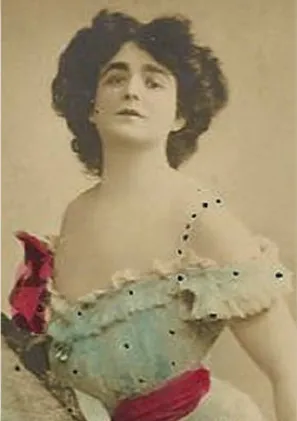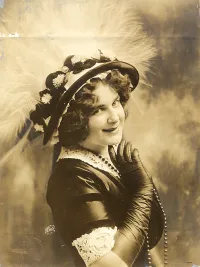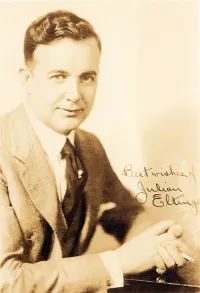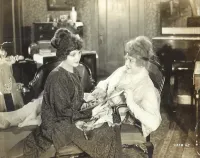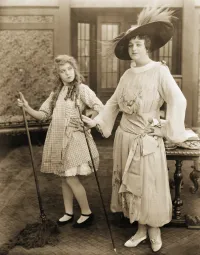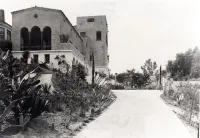Biography
1881 - 1941
“It depends on where you put the paint, not how much you splash on.”
– Julian Eltinge
He began his career as a female impersonator at age 10, and his skills eventually made him a Vaudeville star. By 1906 his successful performances as 'Eltinge' in London culminated with a Command Performance before King Edward VII of England. In 1910 he starred in string of successful musical comedies on Broadway ('The Fascinating Widow', 'The Crinoline Girl', and 'Cousin Lucy') written to showcase his skills. In 1912 he was publicly feted in New York when The Eltinge Theater was dedicated in his honor on 42nd Street. At the time he was one of the highest paid actors in America. In 1914 he headed to Hollywood to star in silent film versions of his Broadway hits as well as 'The Isle of Love' with Rudolph Valentino. What distinguished Eltinge from his contemporaries was his refusal to be a caricature of women; instead he presented a seamless illusion of actually being a woman, and then at the conclusion of his performance would remove his wig to an amazed audience. His transformation, with the aid of his male Japanese dresser, took two hours. Though Eltinge was gay, he wildly overcompensated by frequently getting in fist fights, smoking cigars, and having long “engagements” with women – all of which were captured in staged publicity photographs. Despite his trail-blazing successes, by the 1930s female impersonation began losing popularity and crackdowns on cross-dressing in public had begun to prevent Eltinge from performing in costume. (At one L.A. club he was forced to stand next to displays of his gowns while channeling his characters.) In 1941 he fell ill performing at Billy Rose’s Diamond Horseshoe and died in his apartment 10 days later of a cerebral hemorrhage at age 59. Eltinge’s multi-faceted success as a Female Impersonator has never been equaled.
1881 - 1941
“It depends on where you put the paint, not how much you splash on.”
– Julian Eltinge
He began his career as a female impersonator at age 10, and his skills eventually made him a Vaudeville star. By 1906 his successful performances as 'Eltinge' in London culminated with a Command Performance before King Edward VII of England. In 1910 he starred in string of successful musical comedies on Broadway ('The Fascinating Widow', 'The Crinoline Girl', and 'Cousin Lucy') written to showcase his skills. In 1912 he was publicly feted in New York when The Eltinge Theater was dedicated in his honor on 42nd Street. At the time he was one of the highest paid actors in America. In 1914 he headed to Hollywood to star in silent film versions of his Broadway hits as well as 'The Isle of Love' with Rudolph Valentino. What distinguished Eltinge from his contemporaries was his refusal to be a caricature of women; instead he presented a seamless illusion of actually being a woman, and then at the conclusion of his performance would remove his wig to an amazed audience. His transformation, with the aid of his male Japanese dresser, took two hours. Though Eltinge was gay, he wildly overcompensated by frequently getting in fist fights, smoking cigars, and having long “engagements” with women – all of which were captured in staged publicity photographs. Despite his trail-blazing successes, by the 1930s female impersonation began losing popularity and crackdowns on cross-dressing in public had begun to prevent Eltinge from performing in costume. (At one L.A. club he was forced to stand next to displays of his gowns while channeling his characters.) In 1941 he fell ill performing at Billy Rose’s Diamond Horseshoe and died in his apartment 10 days later of a cerebral hemorrhage at age 59. Eltinge’s multi-faceted success as a Female Impersonator has never been equaled.
Demography
Demography
Gender Male
Sexual Orientation Gay
Gender Identity Cisgender
Ethnicity Caucasian/White
Nations Affiliated United States
Era/Epoch Interwar Period (1918-1939) Progressive Era (1890-1920) Roaring Twenties (1920-1929)
Field(s) of Contribution
Entertainer
Film
Theater
Commemorations & Honors
The Eltinge Theater Dedicated in His Honor (1912)
Demography
Gender Male
Sexual Orientation Gay
Gender Identity Cisgender
Ethnicity Caucasian/White
Nations Affiliated United States
Era/Epoch Interwar Period (1918-1939) Progressive Era (1890-1920) Roaring Twenties (1920-1929)
Field(s) of Contribution
Entertainer
Film
Theater
Commemorations & Honors
The Eltinge Theater Dedicated in His Honor (1912)
Resources
Resources
Resources
